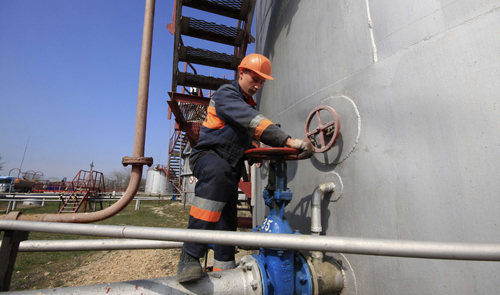European Union member states should reject Moscow's "divide and rule" tactics on pricing its natural gas exports and forge closer gas and power ties with Ukraine and Georgia, EU Energy Commissioner Guenther Oettinger said on Friday.
His call for a uniform Russian gas price for EU members reflects tougher talk in Europe on energy following Russia's annexation of Ukraine's Crimea region and its amassing of troops near their shared border.
"We want a uniform gas price in the European common market," Oettinger said at the joint news conference with Polish Prime Minister Donald Tusk.
Tusk has also promoted the idea of an EU energy union and joint purchases of Russian gas ahead of talks with Russia and Ukraine on the security of Russian supplies.
"The game of 'divide et impera' (divide and rule), or a game of this type proposed by Moscow, cannot be and will not be accepted by EU member states," Oettinger said, referring to the varying prices Russia charges across Europe.
Russian gas exporter Gazprom has renegotiated contracts with several clients in the recent years, including a price cut for Ukraine under former pro-Moscow President Viktor Yanukovich followed by a sharp price hike following his ouster.
Currently, EU member states buy Russian gas under bilateral contracts with Moscow and pay different prices. Common purchases would improve EU's negotiating power and likely lower prices.
Utilities in countries more dependent on Russian supplies, mostly in central Europe, tend to pay more than states in western European where Gazprom is less dominant.
"We have very big differences in terms of gas prices. The higher the share of Russian gas in purchases and the bigger the monopoly Russia has in supplies, the higher the prices are," Oettinger said.
Gazprom said that Oettinger's proposal raised contractual questions.
"We would like to know if the proposal is to unify the price for all suppliers of gas to Europe, not only Russia," said spokesman Sergei Kupriyanov.
Kiev must also first pay off its debt for gas delivered from November to March before any revisions can be negotiated, Gazprom officials said, a figure the company has said tops $2 billion.
"So far we are seeing no progress on this," said Kupriyanov.
Price disputes between Moscow and Kiev prompted Gazprom to switch off supplies in 2006 and again in 2009, causing winter heating and cooking gas shortages in Ukraine and several states which receive gas via the country.
The EU has since made some progress in diversifying its energy mix yet its reliance on Russian oil, gas and coal has continued to rise, with Europe paying Moscow $250 billion in annual energy bills.
Russian gas still accounts for around a third of the EU's imported volumes and a new pipeline to Germany, Nord Stream, was commissioned in 2011.
|
NATO allies proposed to step up defence spending NATO's European members need to increase their defense spending in light of Russia's action in Ukraine, US Defense Secretary Chuck Hagel said in planned remarks released on Friday. "We must see renewed financial commitments from all NATO members," Hagel said in excerpts of speech on the NATO alliance to be delivered at the Wilson Center and released by the Defense Department. |




















































